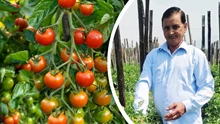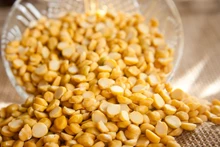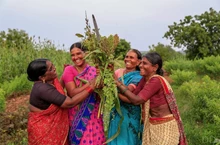
The Cabinet Committee on Economic Affairs (CCEA) has approved the increase in the Minimum Support Prices (MSPs) on 1st June for all mandated Kharif crops for marketing season 2020-21.
Amid the corona crisis, the government has increased the MSP of Kharif crops for marketing season 2020-21, to ensure remunerative prices to the growers for their produce.
The revised prices will provide farmers nearly 50-83 per cent more than the cost, Union Agriculture Minister Narendra Singh Tomar said in a cabinet briefing.
As per reports, the highest increase in MSP is proposed for nigerseed (Rs 755 per quintal) followed by sesamum (Rs 370 per quintal), urad (Rs 300 per quintal) and cotton (long staple) (Rs 275 per quintal).
On the other hand, the cabinet decides Rs. 1,868 for major Kharif crop paddy while Rs. 2,620 for Jowar (Hybrid).
The MSP for ragi, moong and groundnut have also been raised by 50 per cent while MSP for Tur (Arhar) has decided to be Rs. 6000.

Farmers to Get 50-83% more than Cost
As per reports, the increase in MSP for Kharif Crops for marketing season 2020-21 is in line with the Union Budget 2018-19 announcement of fixing the MSPs at a level of at least 1.5 times of the All-India weighted average Cost of Production (CoP), aiming at reasonably fair remuneration for the fanners. The expected returns to farmers over their cost of production are estimated to be highest in case of Bajra (83%) followed by urad (64%), tur (58%) and maize (53%). For the rest of the crops, return to farmers over their cost of production is estimated to be at least 50%.
Government’s strategy is one of promoting sustainable agriculture with diversified cropping pattern matching with the country's agro-climatic conditions, towards higher productivity without jeopardizing nation's bio-diversity. Support is in the form of MSP as well as procurement. Besides, with the intention of giving enough policy thrust to the income security of the farmers. Government's production-centric approach has been replaced by income-centric approach.

MSP for all Kharif crops for marketing season 2020-21:
Revised MSP List for all Kharif crops 2020-21:
|
Sl. No |
Crops |
Projected Cost* KMS 2020-21 |
MSP for Kharif 2020-21 |
Increase in MSP (Absolute)
|
Return over Cost (in %) |
|
1 |
Paddy (Common) |
1,245 |
1,868 |
53
|
50 |
|
2 |
Paddy (Grade A)^ |
- |
1,888 |
53
|
- |
|
3 |
Jowar (Hybrid) |
1,746 |
2,620 |
70
|
50 |
|
4 |
Jowar (Maldandi)^ |
- |
2,640 |
70
|
- |
|
5 |
Bajra |
1,175 |
2,150 |
150
|
83 |
|
6 |
Ragi |
2,194 |
3,295 |
145
|
50 |
|
7 |
Maize |
1,213 |
1,850 |
90
|
53 |
|
8 |
Tur (Arhar) |
3,796 |
6,000 |
200
|
58 |
|
9 |
Moong |
4,797 |
7,196 |
146
|
50 |
|
10 |
Urad |
3,660 |
6,000 |
300
|
64 |
|
11 |
Groundnut |
3,515 |
5,275 |
185
|
50 |
|
12 |
Sunflower Seed |
3,921 |
5,885 |
235
|
50 |
|
13 |
Soybean (yellow) |
2,587 |
3,880 |
170
|
50 |
|
14 |
Sesamum |
4,570 |
6,855 |
370
|
50 |
|
15 |
Nigerseed |
4,462 |
6,695 |
755
|
50 |
|
16 |
Cotton (Medium Staple) |
3,676 |
5,515 |
260
|
50 |
|
17 |
Cotton (Long Staple)^ |
- |
5,825 |
275
|
- |
Distribute pulses to the eligible households under Pradhan Mantri GaribKalyanYojana
In order to provide food security during the prevailing situation due to COVID-19 pandemic, the Government has decided to distribute pulses to the eligible households under Pradhan MantriGaribKalyanYojana (PM-GKY). About 1,07,077.85 MT pulses have so far been an issue/d to the States/UTs.
Pradhan Mantri Annadata Aay Sanraks Han Abhiyan
Besides, the Umbrella Scheme "Pradhan MantriAnnadataAaySanraksHanAbhiyan” (PM-AASHA) announced by the government in 2018 will aid in providing a remunerative return to farmers for their produce. The Umbrella Scheme consists of three sub-schemes i.e. Price Support Scheme (PSS), Price Deficiency Payment Scheme (PDPS) and Private Procurement & Stockist Scheme (PPSS) on a pilot basis.










